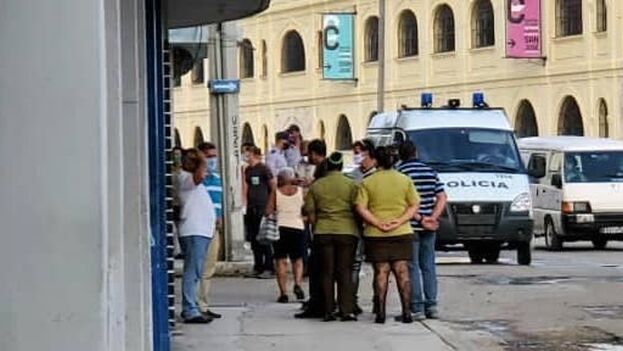
![]() 14ymedio, Havana, 20 November 2020 — A police cordon around the headquarters of the San Isidro Movement, in Old Havana, has blocked pedestrians since since last Monday. State Security arrests anyone who tries to reach the place, where seven activists remain confined in protest of the sentence of eight months in prison for the rebellious rapper Denis Solís.
14ymedio, Havana, 20 November 2020 — A police cordon around the headquarters of the San Isidro Movement, in Old Havana, has blocked pedestrians since since last Monday. State Security arrests anyone who tries to reach the place, where seven activists remain confined in protest of the sentence of eight months in prison for the rebellious rapper Denis Solís.
One victim of State Security is the independent journalist Héctor Luis Valdés Cocho, who was arrested around one in the afternoon on Thursday and released 24 hours later.
“I was in the Zanja police station, they did not give me a mattress to sleep on, and my back is wrecked,” he told 14ymedio after being released this Friday at noon.
The mother of Iliana Hernández, a contributor to the Cibercuba site, was also intercepted this Thursday afternoon, when she wanted to visit her daughter, who is on a hunger strike for Solís’s freedom, convicted of the crime of “contempt.”
In addition, surveillance continues in front of the houses of other activists to prevent them from going out onto the streets, including the artist Tania Bruguera and Michel Matos, a member of the opposition group, who denounced that they have been surrounded for three days. “They do not allow me to leave my own house under penalty of arrest and confinement in one of the many smelly dungeons in Havana … They have limited my internet, I cannot navigate or communicate,” Matos said on his Facebook profile.
Brugera said that, in her case, the surveillance of the police and State Security began on Monday. “Since then, they have taken the internet from me (I already found a way to connect at least once a day). They will not stop our solidarity with our brothers and sisters from MSI, Patria y Libertad!”, she wrote on her social networks.
Adrián Rubio, one of the strikers, announced that this Friday morning three State Security agents visited his mother to persuade her to ask her son to abandon the protest and to leave the Movement’s headquarters.
“They told her that I was now involved in a group of murderers. That everything is a just an act, that we are not on a hunger strike. And that everything is an invention because we are demanding the freedom of a prisoner who is serving time for attempted murder,” he reported. The agents also warned her that his son “neither works nor studies” and that when he leaves the movement’s headquarters that can charge him with “pre-criminal dangerousness” or take him to Pinar del Río “to do military service.”
The Hannah Arendt International Institute of Artivism, directed by Tania Bruguera, expressed solidarity with the activists and their peaceful protest: “There is no justification for the illegality, arbitrariness and inhumanity of these repressive strategies on the part of the State to restrict the freedom of expression.”
The activists reported from the group’s headquarters that Humberto Mena decided to abandon the strike for “personal reasons.” They said that upon arriving at his home, Mena was searched by State Security agents, taken to an unknown place and released after a few hours.
Similarly, the artist Yasser Castellanos reported in on his social networks that he could not continue with the strike because he felt a lot of “discomfort.”
Luis Manuel Otero Alcántara, Esteban Rodríguez, Maykel Castillo, Iliana Hernández, Adrián Rubio, Oscar Casanella and Osmani Pardo continue on hunger strike, and this afternoon it will be 48 hours since the protest began.
Also at the headquarters are Anamely Ramos, Katherine Bisquet, Omara Ruiz Urquiola, Jorge Luis Capote, Niovel Abu Alexander Tamayom and Anyell Valdés Cruz.
____________
COLLABORATE WITH OUR WORK: The 14ymedio team is committed to practicing serious journalism that reflects Cuba’s reality in all its depth. Thank you for joining us on this long journey. We invite you to continue supporting us by becoming a member of 14ymedio now. Together we can continue transforming journalism in Cuba.
